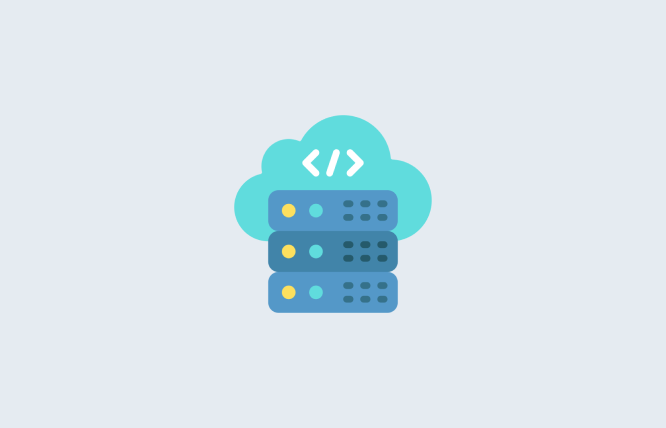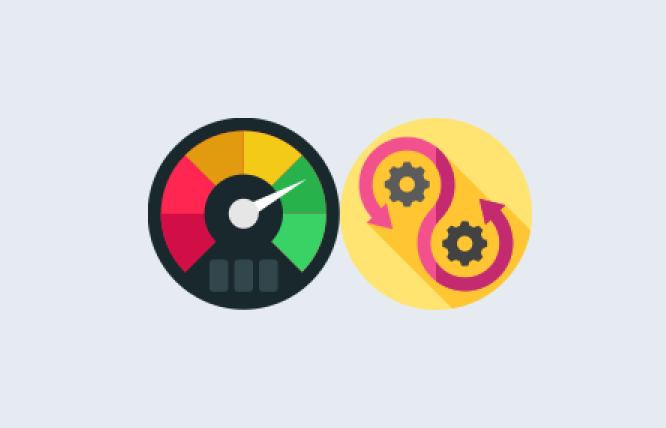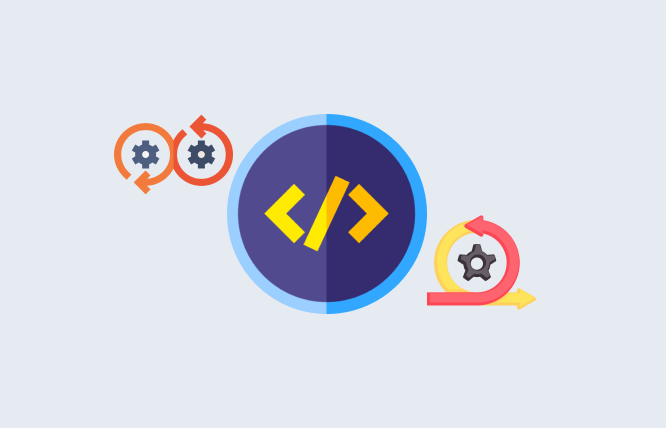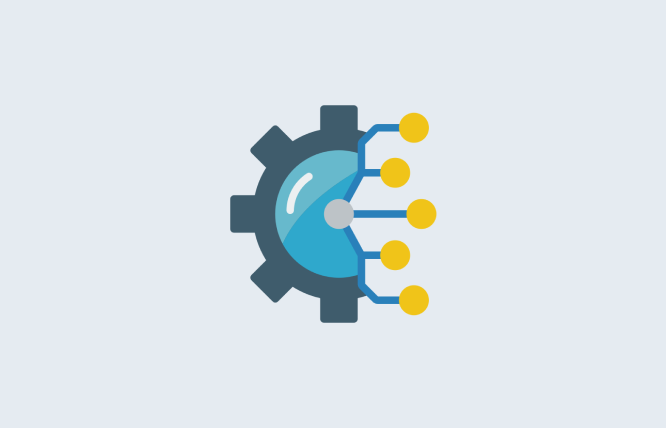Introduction
This blog cuts through the confusion between Site Reliability Engineering (SRE) and DevOps. It explains their similarities, key differences, and when to choose each approach for optimal software development.
With everything digitalised, the downtime of an application can cost a business thousands of dollars. The world today is hyper-connected. Therefore, ensuring flawless application performance and uptime is no longer a luxury; it’s now a necessity.
Roughly up to 82% of companies have experienced unplanned outages in recent years, with each lasting at least four hours on average. So, to streamline the applications, we need to understand the role and importance of Site Reliability Engineering vs DevOps.
And this is where two key disciplines come into play: Site Reliability Engineering (SRE) and DevOps. While their goals might seem similar, they approach achieving them in distinct ways. Understanding these differences is essential for building and maintaining robust, scalable applications.
What is Site Reliability Engineering (SRE)?
Site Reliability Engineering (SRE) is a practice-oriented approach to managing large, complex software systems. SREs are engineers who bridge the gap between development and operations. They focus on building high-performing, scalable systems with the reliability and automation needed to withstand real-world demands.
Here are some core principles of SRE
Automate Repetitive Tasks
SREs automate repetitive tasks to free up time for innovation and problem-solving. This includes automating infrastructure provisioning, application deployment, and performance monitoring.
Metrics-driven Decision-Making
SREs rely on data and metrics to identify potential issues and measure system health. Application Performance Monitoring (APM) tools play a crucial role in gathering these insights.
Service Level Agreements (SLAs)
SREs establish clear SLAs that define acceptable performance thresholds for applications. This helps prioritise tasks and ensure everyone understands user expectations.
Blameless Auditing
When problems arise, SREs examine thoroughly to find out what went wrong rather than pointing fingers. This encourages a mindset of always striving to get better.
In simple terms, site reliability engineers bridge the gap between development and operations teams to ensure smooth collaboration. They specialise in crafting dependable systems through the implementation of DevOps services and solutions.
Responsibilities of A Site Reliability Engineering
An SRE’s responsibilities can vary depending on the organisation, but some common duties include:
- Designing and implementing scalable infrastructure using tools like Kubernetes.
- Developing and maintaining monitoring systems for applications and infrastructure.
- Automating deployments and rollbacks to ensure smooth releases.
- Responding to incidents and troubleshooting application issues.
- Collaborating with developers to improve code quality and reliability.
By applying these principles and taking on these responsibilities, SREs play a vital role in ensuring the smooth operation and high availability of critical systems.
What is DevOps?
Development and Operations, or DevOps, is an approach to culture and methodology that seeks to eliminate the barriers between the development and operations teams. This partnership results in quicker software delivery, better apps, and more efficient operations.
Here are some core principles of DevOps:
Shared responsibility
DevOps emphasises collaboration between developers, testers, and operations personnel throughout the entire software lifecycle. This creates a sense of ownership and accountability for application performance.
Continuous integration and continuous delivery (CI/CD)
DevOps practices automate the software development pipeline. Code changes are continuously integrated into a central repository, followed by automated testing and deployment. This enables faster feedback loops and quicker releases.
Infrastructure as code (IaC)
DevOps promotes treating infrastructure as code. Tools like Kubernetes and Docker containers allow for defining infrastructure configurations in code. This facilitates automated provisioning and management of infrastructure, leading to greater consistency and reliability.
Application Performance Monitoring (APM)
DevOps teams heavily rely on APM tools to gain real-time insights into application health and performance. This data helps identify bottlenecks, troubleshoot issues proactively, and ensure a smooth user experience.
Shift-left security
Security is no longer an afterthought in DevOps. Security practices are integrated throughout the development lifecycle, from code reviews to vulnerability scanning. This proactive approach helps build secure applications from the ground up.
Responsibilities of a DevOps Engineer
A DevOps engineer wears many hats, acting as a bridge between development and operations. Some core responsibilities include:
- Automating build, test, and deployment pipelines using CI/CD tools.
- Configuring and managing infrastructure using Infrastructure as Code (IaC) solutions like Kubernetes or Docker.
- Implementing and maintaining monitoring tools for applications and infrastructure.
- Collaborating with developers to ensure code quality, security, and testability.
- Troubleshooting application issues and resolving production deployments.
By adhering to these principles and taking on these responsibilities, DevOps engineers play a crucial role in streamlining software delivery and ensuring the smooth operation of applications.
Similarities Between SRE and DevOps
Site reliability engineering vs DevOps are not completely different; however, their approaches might be distinct but they share some core philosophies. Both disciplines emphasise:
Breaking down silos
Both SRE and DevOps aim to eliminate the traditional barriers between development and operations teams. This fosters better communication, collaboration, and a shared sense of responsibility for application performance.
Automation
Repetitive tasks are automated using tools and scripts. This frees up valuable time for engineers to focus on higher-level problem-solving and innovation.
Focus on performance
Both SRE and DevOps prioritise application performance and user experience. Application Performance Monitoring (APM) tools play a vital role in both disciplines by providing real-time insights into application health and identifying potential issues.
These shared principles create a foundation for building and maintaining reliable, scalable software systems.
Key Differences Between SRE and DevOps
Site Reliability Engineers primarily focus on the production environment. Their goal is to ensure the reliability, scalability, and performance of deployed applications. They achieve this through automation, monitoring, and incident response.
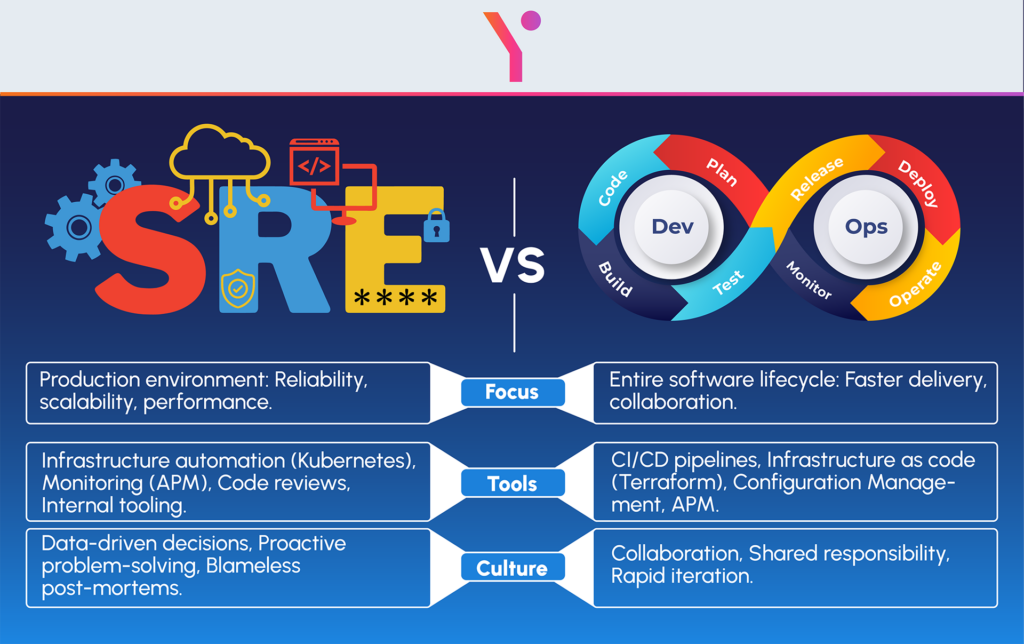
Meanwhile, DevOps engineers have a broader scope, encompassing the entire software lifecycle. They work to streamline the development, testing, deployment, and monitoring processes. Their focus is on speeding up software delivery while maintaining quality and reliability.
Tools and Technologies
SREs leverage tools for infrastructure automation (like Kubernetes), monitoring (APM tools), and incident management. They also place a strong emphasis on code reviews and developing internal tooling for specific needs.
DevOps engineers utilise a wider range of tools, including CI/CD pipelines (e.g., Jenkins, GitLab CI/CD), infrastructure as code solutions (like Terraform)
When to Choose SRE vs DevOps
Deciding between SRE and DevOps depends on the specific goals and priorities of your organisation.
If you focus on creating a strong infrastructure that is scalable and resilient, then DevOps services and solutions could be a perfect match. DevOps practices emphasise teamwork and the use of automation in development, testing, and deployment stages. It is a comprehensive strategy focused on attaining ongoing delivery and integration.
However, if you are more interested in perfecting the structure and process of microservices design and development,, SRE might be the best choice for you. Specialists in Site Reliability Engineering (SRE) are highly skilled at enhancing the efficiency and dependability of complex microservices infrastructures. They utilise a combination of software engineering principles and operational knowledge to guarantee smooth operations and quick iteration.
You should choose between SRE and DevOps based on your organisation’s main objectives, such as improving system stability or optimising the development process.
Here’s a breakdown to help you decide:
Choose SRE if your Focus is On
- Rock-solid reliability: You have mission-critical applications where downtime can have severe consequences.
- Streamlining Production Environment: Your primary concern lies in optimising the performance and scalability of deployed applications.
- Data-driven decision-making: You value a culture that relies on metrics and analysis to guide improvements.
Choose DevOps if your Focus is On
- Faster Software Delivery: You prioritise rapid development cycles and frequent releases to stay ahead of the competition.
- Transparent Collaboration: Your development and operations teams need a framework to work together seamlessly.
- Advanced Adaptability: You operate in a fast-paced environment where embracing new technologies is crucial.
The Synergy of SRE and DevOps
While the focus areas might differ, SRE and DevOps are not mutually exclusive. Many organisations benefit from a hybrid approach. SRE practices can be integrated within a DevOps framework to strengthen production environment management. Conversely, DevOps principles can help SRE teams automate tasks and streamline their workflow.
Conclusion
Understanding the dynamics between Site Reliability Engineering and DevOps is crucial for building and maintaining robust software systems. Both disciplines share core philosophies around automation, collaboration, and performance focus. However, their areas of emphasis and preferred tools differ. By carefully considering your organisation’s needs, you can choose the approach that best aligns with your goals or even leverage a hybrid model for optimal results. Regardless of the chosen path, remember that both SRE and DevOps ultimately strive for the same objective: delivering high-quality, reliable software that meets the needs of your users.
Frequently Asked Questions
This blog dives deep into that! Both aim for high-performing applications, but SRE focuses on the production environment (think reliability and uptime), while DevOps spans the entire software lifecycle (think faster releases).
It depends! If rock-solid reliability is key, SRE might be ideal. For faster software delivery, DevOps shines. But they can work together! FuturByte can help you pick the right approach (we offer devops services and solutions).
Application Performance Monitoring (APM) is key! FuturByte can help you set up APM tools to catch issues before they impact users.
Our team of experts at FuturByte can help you assess your specific needs and recommend the most suitable approach, whether it’s SRE, DevOps, or a hybrid model. We understand the intricacies of both disciplines and can guide you towards building a robust and efficient software development lifecycle.
Absolutely! FuturByte’s expertise extends to the underlying technologies that power modern applications. We have a team of Docker expert consultants with deep knowledge of Docker and Kubernetes consultancy, ready to assist you with containerisation, orchestration, and overall application performance optimisation.
Have questions or feedback?
Get in touch with us and we‘l get back to you and help as soon as we can!
